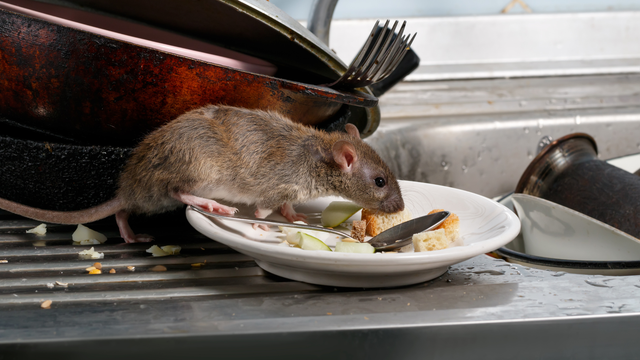Rodent Behavior: Surprising Facts to Protect Your Home
Have you ever wondered why rodents act the way they do? Understanding rodent behavior can help you protect your home, keep your pets safe, and even appreciate these small creatures a little more.
Whether you’re dealing with an unexpected visitor in your basement or just curious about what makes rodents tick, this guide will give you clear insights you can use right away. Keep reading to discover surprising facts and practical tips that could change how you see these tiny but clever animals.
Rodent Habits At Home
Rodents are common visitors in many homes. Understanding their habits helps in managing and preventing infestations. They behave in ways that keep them hidden and safe. Their habits focus on finding food, shelter, and avoiding danger. Learning about these behaviors reveals why they choose certain spots and times to be active.
Nocturnal Activity Patterns
Rodents are mostly active at night. They avoid daylight to stay safe from predators. Nighttime offers quiet and darkness, perfect for moving around. They search for food and water during these hours. This pattern helps them stay hidden and undetected.
Common Hiding Spots
Rodents prefer dark, warm, and quiet places. They hide in walls, under floors, and behind appliances. Cluttered areas like basements and attics are popular spots. Small gaps and cracks serve as entry points and shelters. These places keep them safe and close to food.
Food Preferences And Storage
Rodents like grains, seeds, and leftover human food. They often eat nuts, fruits, and even pet food. They carry food to hidden spots to store for later. This behavior helps them survive when food is scarce. They chew packaging to access food inside.

Credit: maze.conductscience.com
Signs Of Rodent Presence
Rodents often stay hidden, but signs of their presence appear around your home. Noticing these clues early helps stop damage and health risks. Watch for sounds, marks, and smells that rodents leave behind.
Unusual Noises And Movements
Rodents are mostly active at night. You might hear scratching or scampering inside walls or ceilings. Soft squeaks or rustling sounds may come from attics or basements. These noises show rodents moving, eating, or building nests.
Droppings And Gnaw Marks
Rodent droppings are small, dark, and pellet-shaped. Finding droppings near food or hidden corners is a strong sign. Rodents chew on wood, wires, and plastic. Look for fresh gnaw marks on furniture or boxes. These marks are rough and uneven.
Odors And Nesting Materials
Rodents leave a strong, musky smell. The odor comes from their urine and body oils. It often grows worse over time. Nesting materials include shredded paper, fabric, and dried plants. Find these in quiet, hidden spots like behind appliances.
Rodent Intelligence And Adaptability
Rodents are more than just small animals scurrying around. They show surprising intelligence and adaptability. These traits help them survive in many places. Understanding their behavior can reveal how clever they really are.
Problem Solving Skills
Rodents can solve puzzles to get food or escape danger. They use trial and error to find solutions. This skill helps them avoid traps and find hidden resources. Their ability to think ahead is key to their survival.
Learning And Memory
Rodents remember safe paths and food locations well. They learn from past experiences quickly. This memory helps them avoid threats and return to good food spots. Their learning ability improves over time with repeated exposure.
Adapting To Human Environments
Rodents adjust easily to cities and homes. They find shelter in walls, basements, and garbage areas. Their flexible diet allows them to eat almost anything. This adaptability makes them tough to control in urban areas.

Credit: www.nature.com
Health Risks Linked To Rodents
Rodents carry many health risks that affect humans. These small animals spread diseases, cause allergies, and contaminate food. Understanding these dangers helps protect your home and family.
Diseases Transmitted
Rodents spread serious diseases to people. They carry bacteria, viruses, and parasites. Some common diseases include hantavirus, leptospirosis, and salmonella. These illnesses can cause fever, vomiting, and even death. Rodent bites can also lead to infections. Avoid contact with rodents and their droppings.
Allergies And Asthma Triggers
Rodents produce allergens that trigger asthma and allergies. Their urine, droppings, and dander cause reactions. People with asthma may suffer more attacks. Children and elderly are especially at risk. Cleaning rodent areas carefully reduces exposure to allergens.
Contamination Of Food And Surfaces
Rodents contaminate food by leaving droppings and urine. They also carry germs on their fur and paws. Contaminated food can cause food poisoning. Surfaces touched by rodents become unsafe. Proper cleaning and sealing food help prevent contamination.
Effective Prevention Strategies
Stopping rodents before they enter your home is key to avoiding damage and health risks. Effective prevention strategies help keep these pests away. Small actions can make a big difference in keeping rodents out. Focus on three main areas to protect your space.
Sealing Entry Points
Rodents squeeze through tiny gaps and cracks. Close holes around doors, windows, and pipes. Use steel wool or caulk to block openings. Check your home’s foundation and walls regularly. Sealing stops rodents from finding easy access inside.
Proper Food Storage
Rodents follow food smells. Store food in airtight containers made of glass or metal. Avoid leaving crumbs or spills on counters. Keep pet food sealed and off the floor. Proper storage reduces attraction and food availability for rodents.
Maintaining Cleanliness
Clutter and trash invite rodents to settle. Clean floors and surfaces daily to remove food particles. Take out trash regularly and use bins with tight lids. Keep outdoor areas tidy and free of debris. A clean space discourages rodents from making a home.
Safe Rodent Control Methods
Safe rodent control methods protect your home and health. They remove pests without harming people, pets, or the environment. Choosing the right method helps keep your space clean and safe. These methods also prevent rodents from coming back.
Traps And Baits
Traps catch rodents without poison. Snap traps kill rodents quickly and humanely. Live traps catch them so you can release them far away. Baits attract rodents to traps. Place traps where rodents often appear. Check traps daily to avoid odors and mess.
Natural Repellents
Natural repellents keep rodents away without chemicals. Peppermint oil, garlic, and cloves smell strong to rodents. Spray these oils near entry points and nests. Ultrasonic devices send sounds rodents dislike. These sounds cannot be heard by humans. Natural repellents are safe for children and pets.
Professional Pest Control
Professional pest control offers expert rodent removal. Technicians use safe tools and products. They find rodent entry points and seal them. Professionals provide advice to prevent future infestations. Hiring experts saves time and ensures full control. Their methods follow health and safety rules.
Behavioral Insights To Deter Rodents
Understanding rodent behavior helps in keeping them away effectively. Rodents follow patterns and prefer specific places to live and feed. Changing their environment and habits can stop them from settling in your space.
Avoiding Habitats They Prefer
Rodents like dark, quiet, and warm spots. Cluttered areas, piles of wood, and trash attract them. Keep places clean and dry. Remove food scraps and seal garbage bins. Close gaps and holes around your home. This makes the area less inviting to rodents.
Disrupting Their Routines
Rodents follow regular paths and schedules for food and shelter. Changing these paths can confuse them. Move objects and furniture often. Clean floors and surfaces regularly. This breaks their habit of returning to the same spots. Interrupt their routine, and they may leave.
Using Scent And Sound Deterrents
Rodents dislike certain smells like peppermint, garlic, and ammonia. Place cotton balls with these scents near entry points. Ultrasonic devices create sounds rodents hate. These sounds are silent to humans but disturb rodents. Use these deterrents to create an uncomfortable environment for them.

Credit: www.superiorspray.com
How Smart Pets Lover Can Help You with Rodent Behavior
Turning Rodent Behavior Into Learning Opportunities
Understanding rodent behavior opens up practical ways to protect your home and deepen your connection with the animal world. Observing rodent habits at home and recognizing signs of their presence can teach us about their intelligence and adaptability—traits that are fascinating and useful when designing effective prevention strategies.
By paying attention to how rodents navigate spaces and respond to environmental changes, pet parents can apply these insights to create safer, rodent-free environments while also appreciating the complexity of these creatures. This knowledge aligns perfectly with the spirit of Smart Pets Lover, where every interaction with animals—whether a curious rodent or a loyal dog—adds to our understanding and respect for them.
- Keep a journal of any rodent activity you notice to track patterns over time.
- Experiment with safe rodent control methods informed by behavioral cues.
- Share your observations with local animal care groups or pest experts to learn more.
For more detailed advice or to discuss specific concerns, reaching out to wildlife experts or local pest control professionals can provide personalized support. After all, being informed and thoughtful is the best way to care for all creatures sharing our spaces.
Frequently Asked Questions
What Are Common Signs Of Rodent Behavior Indoors?
Rodents often leave droppings, gnaw marks, and nesting materials. You may hear scratching or squeaking sounds at night. They prefer dark, hidden spaces near food and water sources.
How Do Rodents Communicate With Each Other?
Rodents use vocalizations, scent marking, and body language to communicate. They emit high-pitched sounds and leave pheromone trails to mark territory and signal danger.
Why Do Rodents Gnaw On Objects Frequently?
Rodents gnaw to keep their continuously growing teeth short and sharp. This behavior helps prevent dental issues and allows them to access food or create nests.
What Attracts Rodents To Homes And Buildings?
Rodents are attracted by food crumbs, accessible water, and warm shelter. Clutter and open entry points also invite them inside for nesting and feeding.
Conclusion
Rodents show many interesting behaviors that help them survive. They explore, hide, and search for food every day. Understanding these habits can help us live safely alongside them. Watching how they act reveals their cleverness and strong survival skills. Knowing rodent behavior helps in keeping homes clean and safe.
Always respect nature’s small creatures and their ways. Learning about rodents makes us more aware of the world around us. Simple knowledge can make a big difference.





